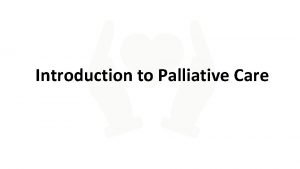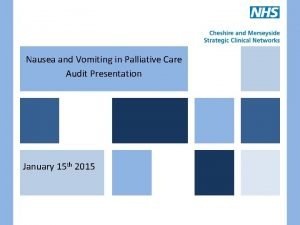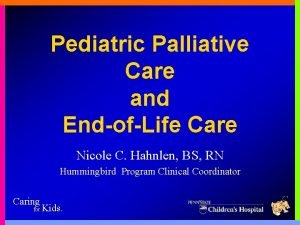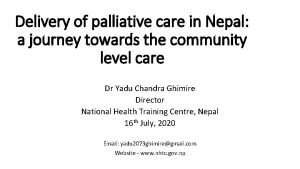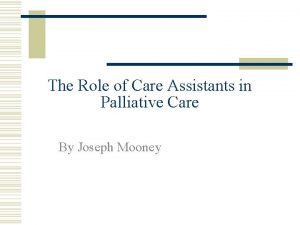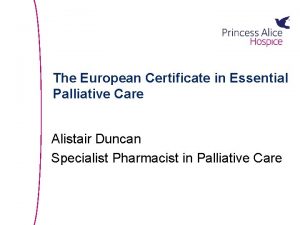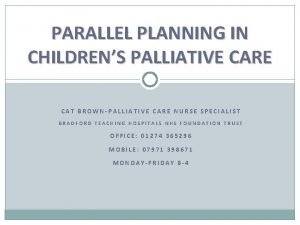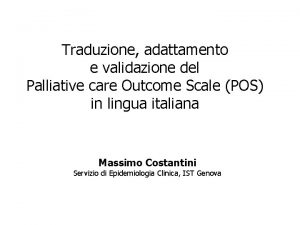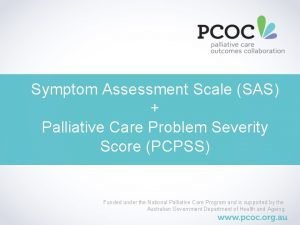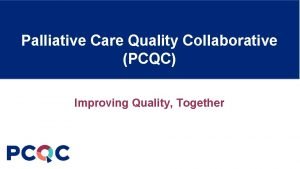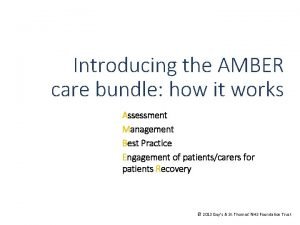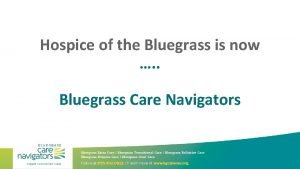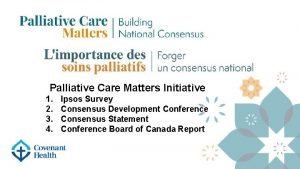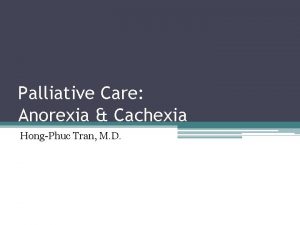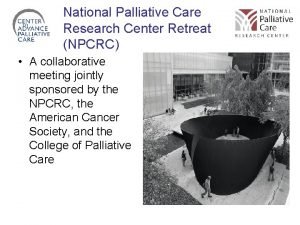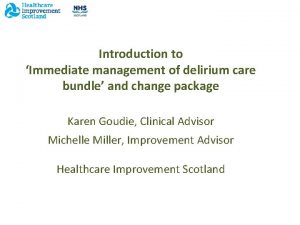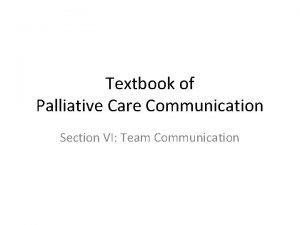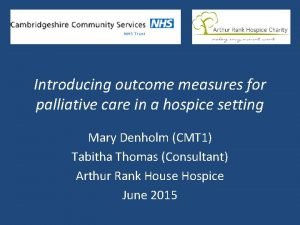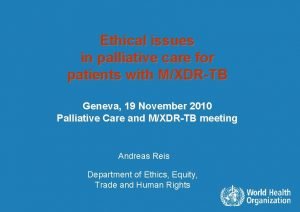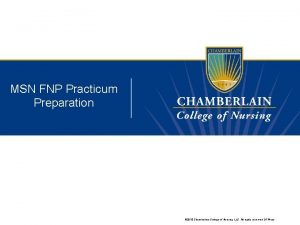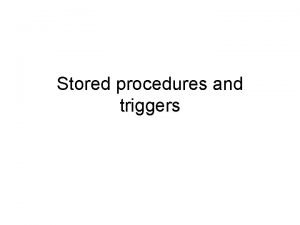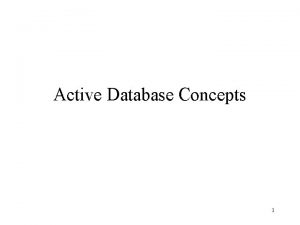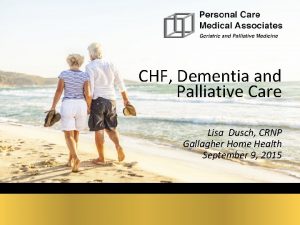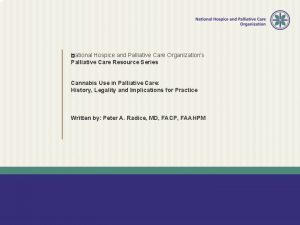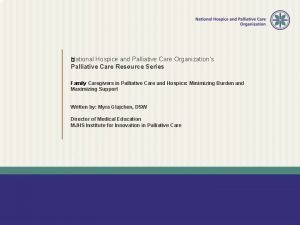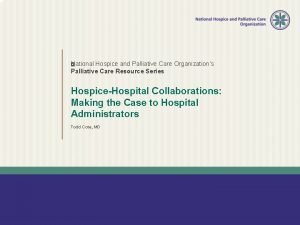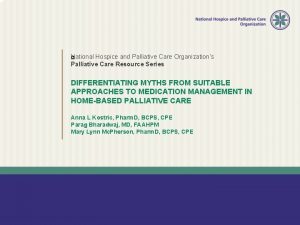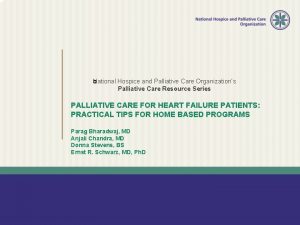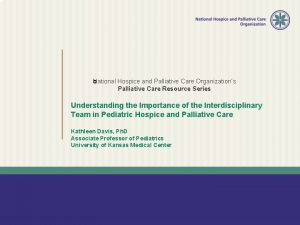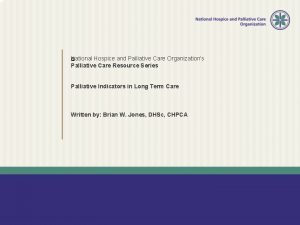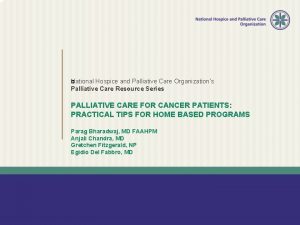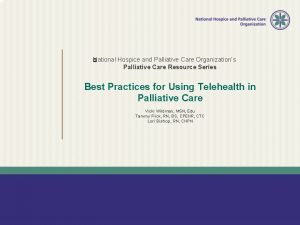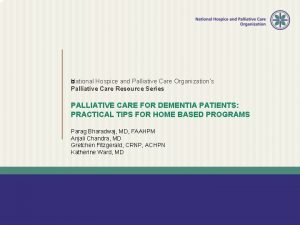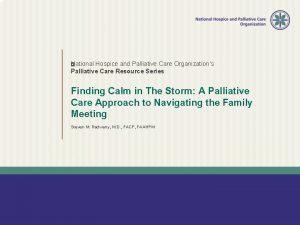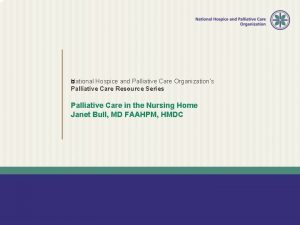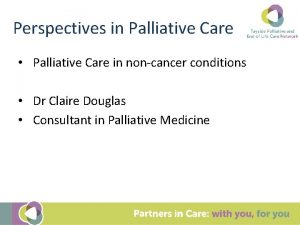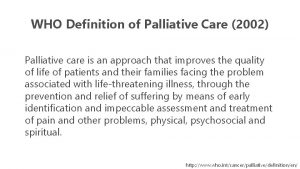Palliative Care Triggers Jay Hartle DNP CRNP and







































- Slides: 39

Palliative Care Triggers Jay Hartle, DNP, CRNP and Lisa Dusch, CRNP Progressive Home Health August 26, 2015 246 Friendship Circle, Beaver Pa 15009| www. pcmanetwork. com

Objectives 1. Define palliative and hospice care. 2. Understand the continuum from palliative care to hospice care. 3. Identify palliative care triggers. 4. Describe content of palliative home visit by Physician/NP. 5. Discuss palliative care with patients and family using case studies. 6. Increase comfort level with palliative conversations. 246 Friendship Circle, Beaver Pa 15009| www. pcmanetwork. com

Palliative Care • Definition: – Palliative Care refers to those processes of care designed to prevent and treat physical, emotional and spiritual suffering in order to enhance quality of life for patients with chronic, progressive illness. Palliative care strives to improve the quality of life regardless of the stage of illness or types of treatment. Palliative care may be appropriate when a patient is receiving aggressive curative treatments, or is in the final days of weeks of life. • - (From AMDA White Paper on Palliative Care and Hospice in Long Term Care) 246 Friendship Circle, Beaver Pa 15009| www. pcmanetwork. com

Hospice • Definition: – Hospice is a system for delivering palliative care. Palliative care is a continuum with better function at the initiation of palliative care and decreasing function with increasing symptoms at the other end of the continuum which is hospice. 246 Friendship Circle, Beaver Pa 15009| www. pcmanetwork. com

Continuum of Care • • • Medical issues respond to curative interventions Few symptoms Good function with ion s m pto tervent m y s ing al in s c a i e d r e Inc gm n i s a incre Decr easin g fun ction 246 Friendship Circle, Beaver Pa 15009| www. pcmanetwork. com

-requires medical care but no significant limitations to work, recreation, lifestyle -medical goals are curative (fix the problem) -symptoms are increasing -function is decreasing -increasing ED visits, hospitalizations -goal of care is to maintain function and comfort, no longer curative Comfort/Hospice -functioning well with chronic illness -symptoms managed with medications and lifestyle changes Functional/Palliative Longevity Continuum of Care -function is extremely limited - most likely home bound -goal of care is comfort 246 Friendship Circle, Beaver Pa 15009| www. pcmanetwork. com

Comfort/Hospice Functional/Palliative Longevity Continuum of Care 246 Friendship Circle, Beaver Pa 15009| www. pcmanetwork. com

Palliative Care Triggers 1) “Would you be surprised if this patient died in the next year? ” • If the answer is NO, a consult is appropriate to begin to formulate a plan of care to focus on maintaining current level of function and managing advanced or end stage illnesses. 246 Friendship Circle, Beaver Pa 15009| www. pcmanetwork. com

Palliative Care Consult Triggers • 2) Did the Patient have 2 hospitalizations or 3 ED visits or any combination of 3 or more hospitalizations or ED visits in the past year for: – COPD – CHF – Cancer – Dementia 246 Friendship Circle, Beaver Pa 15009| www. pcmanetwork. com

Palliative Care Consult Triggers COPD – Repeated ED/ Hospitalizations for COPD in the past year. – Dyspnea at rest, unresponsive to bronchodilators. – Decline in physical activity due to dyspnea, increased dependence for ADLs. – “my inhalers just don’t work like they used to”, “I don’t go upstairs anymore” 246 Friendship Circle, Beaver Pa 15009| www. pcmanetwork. com

Palliative Care Consult Triggers • CHF – Repeated ED/Hospitalizations for CHF in the past year. – Symptomatic at rest, despite optimal diuretic/vasodilator therapy. – New York Hear Association Class IV disease. (unable to cary out any physical activity without discomfort. Symptoms of cardiac insufficiency at rest. If any physcial activity is undertaken, discomfort is increased. ) – Ejection Fraction less than 20%. – “ My lasix isnt working”, “ My legs are always swollen” 246 Friendship Circle, Beaver Pa 15009| www. pcmanetwork. com

Palliative Care Consult Triggers • Cancer – All patients with Stage III Cancer. (new recommendation since previous presentation) – Patients who have declined further treatment or treatment has been discontinued due to poor response. – Patients with uncontrolled symptoms ie: Pain, shortness of breath, nausea, and anxiety. 246 Friendship Circle, Beaver Pa 15009| www. pcmanetwork. com

Palliative Care Consult Triggers • Dementia – Decline in functional status, unable to complete ADLs independently – Increasing agitation, anxiety, or psychosis – Weight loss – Poor appetite 246 Friendship Circle, Beaver Pa 15009| www. pcmanetwork. com

Palliative Care Consult Triggers 3) Patients with uncontrolled symptoms which include: – Pain – Shortness of Breath – Nausea – Anxiety – Agitation/Psychosis 246 Friendship Circle, Beaver Pa 15009| www. pcmanetwork. com

Palliative Care Consult Triggers 4) Patients and families who need assistance with advanced care planning or further clarification of goals of care. - Collaboration with PCP for support with medical decision making. -Completion of POLST/Advanced directives. 5) Inability to get to PCP - Due to physical or social issues. 246 Friendship Circle, Beaver Pa 15009| www. pcmanetwork. com

Palliative Care Consult Triggers • General Indicators – Weight loss (weight and age are getting closer together) – Physical decline, unable to complete ADLs without assistance ( decrease in function) – Multiple co morbidities (increase in medical care) 246 Friendship Circle, Beaver Pa 15009| www. pcmanetwork. com

Palliative Care Home Visit • Physician/Nurse Practitioner visit 1) Assess the here and now: “ we understand that you have been having medical problems”, “what have you been told? ” 2) Establish patient’s goals of care: “what do you want? ”, “what is important to you? ” -Family, social activities, religious involvement 3) Identify symptoms that are affecting patient’s function or well being. 4) Review medications. Add? Discontinue? 5) End of life discussion with POLST and advanced directives. 246 Friendship Circle, Beaver Pa 15009| www. pcmanetwork. com

Palliative Care Home Visit • Palliative summary: – Functional status/goals – Symptom control/med changes/recommendations – Spiritual/Religious needs – Emotional supports/needs – Social supports/needs – End of life discussion 246 Friendship Circle, Beaver Pa 15009| www. pcmanetwork. com

Case Study #1 • Hazel is a 83 yo female. • HPI: Recent 3 day hospitalization for COPD exac, CHF. Now with increased dyspnea, increased confusion, poor appetite, increased depression and overall increase in debility since d/c. Daughter was unable to get her to PCP for hospital follow up. • PMH: COPD, CHF, O 2 dependence, CAD, HTN, dementia • Social: Widow, lives alone in 2 story home, adult children have provided 24 hour care over the last month. 246 Friendship Circle, Beaver Pa 15009| www. pcmanetwork. com

Case Study #1 • Exam: • 97. 5 -65 -16 106/56 98% at rest on 3 liters and 91% after walking 125 feet. Wt 110. 8 lbs • No fluid overload, looks dry • Lungs clear • Extremities without edema. • + confusion, poor memory, requires queing for ADLs

Case Study #1 • What are the goals of patient and family? – 1) Patient and family want her to stay in the home as long as possible. Will change medications to manage dyspnea and dementia symptoms. – 2) Patient loves to go to shopping. Will adjust COPD meds to try to improve function. Recommended WC in store or motorized vehicle.

Case Study #1 • • • • Medications 1. Lopressor 25 mg BID 2. Methamazole 5 mg q am 3. Lexapro 10 mg daily 4. Advair Diskus 250/50 one puff BID 5. Montelukast 10 mg HS 6. Lotrel 10/40 qam 7. Aspirin 81 mg qam 8. Nexium 40 mg qam 9. Spiriva handihaler one inhalation q am 10. Potassium 99 mg pa q am on M-W-F 11. Lorazepam 0. 5 mg BID as needed 12. Furosemide 40 mg po BID 13. Trazadone 50 mg q. HS PRN insomnia

Case Study #1 • Daughter indicates that pt refuses medications and is not using inhalers appropriately. • Changes made to meds: – DC inhalers, use pulmicort respules, prednisone taper ending with 10 mg daily – Decrease furosemide to daily. – Change citalopram to Remeron 15 at night, improve sleep, increase appetite, address depression – Add Aricept 5 mg for increasing dementia s/s. 246 Friendship Circle, Beaver Pa 15009| www. pcmanetwork. com

Case Study #1 • Discussed POLST with daughter/POA – DNR/DNI, limited interventions with no feeding tube and antibiotics as indicated. • Next steps/Plan of care - discussed that if function was not improved with PT and medication changes, at some point hospice should be considered. Dtr understood and agreed. 246 Friendship Circle, Beaver Pa 15009| www. pcmanetwork. com

Case Study #1 • Dictation of visit forwarded to PCP and home health agency. Will follow up with patient at the request of PCP, family, or home health agency. 246 Friendship Circle, Beaver Pa 15009| www. pcmanetwork. com

Case Study #2 • James is a 78 yo white male. • HPI: Pt has had 2 hospitalizations in the last month for Afib with RVR and then readmit in 8 days for afib, bradycardia, weakness, presyncope. He is now feeling well, minimal dyspnea. • PMH: afib, CAD with stenting, Cervical spinal stenosis, Mild CHF, HTN, Depression, dyslipidemia, GERD, dementia • Social: Lives with his wife in a basement level apartment, previous smoker, no ETOH. 246 Friendship Circle, Beaver Pa 15009| www. pcmanetwork. com

Case Study #2 • • Exam: Afebrile, HR 50, Resp 16 BP 108/60 O 2 98% on room air AAOx 3, no confusion noted during exam. Apical: Irreg, rate 50 Lungs: Clear Extremities without edema Most recent ECHO: EF 60%, Grade 1 diastolic dysfunction Recent labs: BUN 12 Cr 0. 9 246 Friendship Circle, Beaver Pa 15009| www. pcmanetwork. com

Case Study #2 What is important to patient? • -church related activities • -artwork in the home He is able to do both without restriction. 246 Friendship Circle, Beaver Pa 15009| www. pcmanetwork. com

Case Study #2 1) 2) 3) 4) 5) 6) 7) 8) 9) 10) 11) 12) 13) 14) Metoprolol 25 mg bid MVI daily Protonix 20 mg daily Citalopram 10 mg daily Eliquis 5 mg daily Diltiazem 120 mg daily Miralax daily Namenda 10 mg bid Atorvastatin 10 mg qhs Oxybutynin 5 mg tid ASA 81 mg daily Imdur 30 mg daily Lasix 20 mg daily Multaq 400 mg bid 246 Friendship Circle, Beaver Pa 15009| www. pcmanetwork. com

Case Study #2 • Pt with regular visits to PCP and cardiology. • No transportation or mobility issues. • No medications changes. 246 Friendship Circle, Beaver Pa 15009| www. pcmanetwork. com

Case Study #2 • POLST/advanced directives • Pt and wife had not had a conversation about end of life wishes. Pt wanted to resuscitated if it would help. • Education provided about CPR, what it entails, and outcome statistics. POLST was then completed with patient and wife, indicating CPR with full treatment, discontinuing interventions after no improvement in 34 days. Copy was forwarded to PCP and home health agency. 246 Friendship Circle, Beaver Pa 15009| www. pcmanetwork. com

Comparing Case Studies • • • Both patients in the same age group. Both patients with multiple chronic illness. Both patients with dementia diagnosis. 2 different stages in chronic illness. Level of function is very different. Look at triggers, look at function, where is patient at in the continuum. 246 Friendship Circle, Beaver Pa 15009| www. pcmanetwork. com

Palliative converstions • Ask and Listen: What have you been told about your illness/health? What do you think? How does that make you feel? • Listen and look: What is in the home? Pictures of family? Pets? Collections? Religious articles? 246 Friendship Circle, Beaver Pa 15009| www. pcmanetwork. com

Palliative conversations • Ask? What is it that you want? – Medical: symptom relief – Social: participate in hobbies, activities? – Emotional: repair relationships? Resolve conflicts? – Family: spend more time, address issues? – Religious: attend services, have clergy visit? 246 Friendship Circle, Beaver Pa 15009| www. pcmanetwork. com

Palliative conversations • Give the patient and family answers to their questions. Too much information is overwhelming. If they did not ask for the information they may not be able to process the information. 246 Friendship Circle, Beaver Pa 15009| www. pcmanetwork. com

Palliative Conversations • Refer to Palliative care • Avoid the word Palliative. – Mr. Jones, you have been having a rough time of it lately. You’ve been in the hospital 2 x in the last 2 months and your shortness of breath is not improving with your medications. You are having more trouble taking care of yourself because you are short of breath. We have physicians and nurse practitioners that can come in to the home and evaluate you for these symptoms. They will work with your PCP to see if they can help keep you out of the hospital and doing some of the things that you like to do for yourself. 246 Friendship Circle, Beaver Pa 15009| www. pcmanetwork. com

Palliative Conversations • The more that you have the conversation the easier it gets. • Listen first, give the information that the patient or family is asking for, then follow up. – I am hearing you say…. – Am I correct that you would like……. – How does that make you feel……. . 246 Friendship Circle, Beaver Pa 15009| www. pcmanetwork. com

Summary • Palliative care is a continuum of care that starts with loss of function due to chronic illness and ends with hospice care. • Identify triggers for palliative consult. Look at the patient then look at the chart. • Become comfortable with palliative discussions. The discussion gets easier the more that you do it. 246 Friendship Circle, Beaver Pa 15009| www. pcmanetwork. com

This presentation is the property of Personal Care Medical Associates and is not to be distributed to, nor shared with any other organization without written consent from authors. 246 Friendship Circle, Beaver Pa 15009| www. pcmanetwork. com
 Jay hartle
Jay hartle Palliative care versus hospice care
Palliative care versus hospice care Franciscan palliative care
Franciscan palliative care Difference between metoclopramide and domperidone
Difference between metoclopramide and domperidone Edmonton symptom assessment system
Edmonton symptom assessment system Rug palliative care
Rug palliative care Hospice satisfaction survey
Hospice satisfaction survey Principles of palliative care
Principles of palliative care Palliative care in nepal
Palliative care in nepal Palliative care assistant
Palliative care assistant European certificate in palliative care
European certificate in palliative care Parallel planning palliative care
Parallel planning palliative care Outcome measures traduzione
Outcome measures traduzione Sas scale
Sas scale Pcqc
Pcqc Just in case bag palliative care
Just in case bag palliative care Amber care bundle
Amber care bundle Goscote palliative care centre
Goscote palliative care centre Palliative care at home barry
Palliative care at home barry Hospice of the bluegrass frankfort ky
Hospice of the bluegrass frankfort ky Calvary palliative care
Calvary palliative care Anorexia palliative care
Anorexia palliative care Palliative care matters
Palliative care matters Dr hong-phuc tran
Dr hong-phuc tran Goc palliative care
Goc palliative care National palliative care research center
National palliative care research center European delirium association
European delirium association Epeco
Epeco Textbook of palliative care communication
Textbook of palliative care communication Oacc palliative care
Oacc palliative care Ethical issues in palliative care
Ethical issues in palliative care Que es sicodis
Que es sicodis Chamberlain dnp curriculum
Chamberlain dnp curriculum Uca dnp program
Uca dnp program Ciclo de vida de un proyecto de inversión
Ciclo de vida de un proyecto de inversión Primary care secondary care tertiary care
Primary care secondary care tertiary care Triggers and routines in sql
Triggers and routines in sql Triggers and assertions
Triggers and assertions Active database concepts and triggers
Active database concepts and triggers Triggers and active database in dbms
Triggers and active database in dbms

